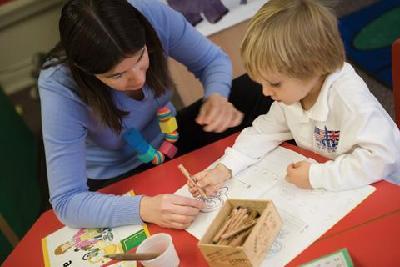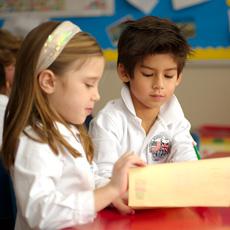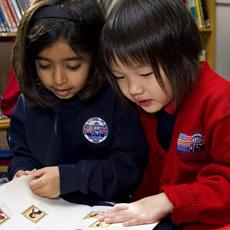
One size does not fit all. That's the philosophy behind an innovative approach to primary education which started in Britain less than a decade ago.
The International Primary Curriculum (IPC) is now taught in more than 1,000 primary schools in 58 countries, including the United States. The curriculum personalizes education and applies an internationally-minded approach to learning.
Alison Kerr is a second grade teacher in the British American School of Los Angeles, one of a few American private schools that teaches the International Primary Curriculum. She says the main goal of the curriculum is to engage children in the learning process. This term, for example, her class is learning about historical figures.
"I got the children to come in secret and dress up with several clues of a famous person. They had to research and bring us ten written clues and the rest of the class had to guess who these significant people were," says Kerr. "So the children do not simply do the same work, sheet type of format every single time."

"One size does not fit all education these days." says educator Martin Skelton. He co-authored the IPC eight years ago, and he says for kids to learn and succeed, they need a program that allows them to learn individually.
"Our view is the teachers should really be thinking about their kid in their class and why they are not learning and trying to work out what they are going to be doing tomorrow to help individual kids learn much better," another important goal, Skelton says, is preparing today's children to become 21st century leaders. "Most of world problems are going to be solved internationally now. I mean no single country is going to solve the environment or terrorism. It's a multi co-operational activity."
To make that possible, he says, the curriculum focuses on developing inquiring minds and personal qualities so children become good citizens of the world.

"We have very specific activities built in the curriculum around the development of international mindedness right from the age five onwards. We encourage the kids to mingle with schools in other countries and then of course things like skype now make that fantastically easy to do."
We did have a fair called Around the World in a Day. We have 51 nationalities represented and we have parents. They put together a wonderful exhibition. Emma Northey is head of Primary Learning at the British school in Bosten. She just describes one activity designed to teach kids about similarities among different cultures.
"The children were each given a passport. They basically knew that they were going around the world in a day and we said to them, 'You have to come back with two similarities that you had seen between the different cultures.' Even the three year olds came back to me saying, 'Gosh, you know everybody writes. Some people write going down. Some people write from left to right, some from right to left.'"
Kate Foy of the British School in Washington DC says the children have to live the learning experience and deliver their findings in the form they prefer, whether as an oral presentation, an art form, or in writing. The teacher's role has also changed.
"Teacher's role is to facilitate the learning in their classroom, to enable those students to discover for themselves. And you kind of have to sit back a little bit," says Foy. "You have to make sure you're asking the right questions. You maneuver yourself around the classroom and enable the children to learn as opposed to telling them and kind of spoon feeding them. Absolutely no question there is no way, no room for spoon feeding when it comes to the IPC."
IPC co-author Skelton says the feedback so far is encouraging. Students and teachers say the curriculum makes the classroom more exciting.
Kids should study less, play more
Government proposes big spending on math and science educational programs
(來(lái)源:VOA 編輯:崔旭燕)
